目录
OxyPlot是一个强大的跨平台绘图库,非常适合在WinForms应用程序中创建各种类型的图表。本指南将重点介绍如何使用OxyPlot创建各种线图,并提供多个完整的示例。
环境设置
首先,确保您已经安装了OxyPlot。在Visual Studio中,通过NuGet包管理器安装以下包:
- OxyPlot.Core
- OxyPlot.WindowsForms
或者在包管理器控制台中运行:
C#Install-Package OxyPlot.Core Install-Package OxyPlot.WindowsForms

在您的Form类中,添加以下using语句:
C#using OxyPlot;
using OxyPlot.Series;
using OxyPlot.WindowsForms;
基本线图
让我们从一个基本的线图开始。这个例子展示了如何创建一个简单的正弦波线图。
C#public partial class Form1 : Form
{
public Form1()
{
InitializeComponent();
CreateBasicLineChart();
}
private void CreateBasicLineChart()
{
var plotView = new PlotView();
plotView.Dock = DockStyle.Fill;
this.Controls.Add(plotView);
var plotModel = new PlotModel { Title = "Basic Line Chart" };
var series = new LineSeries { Title = "sin(x)" };
for (double x = 0; x < 10; x += 0.1)
{
series.Points.Add(new DataPoint(x, Math.Sin(x)));
}
plotModel.Series.Add(series);
plotView.Model = plotModel;
}
}
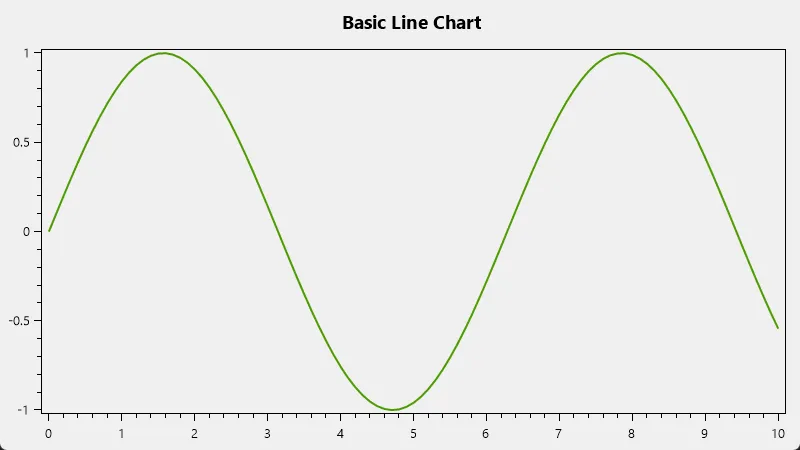
这个例子创建了一个基本的正弦波线图,展示了如何设置PlotView,创建PlotModel和LineSeries,以及如何添加数据点。
多系列线图
下面的例子展示了如何在一个图表中创建多个线系列。
C#private void CreateMultiSeriesLineChart()
{
var plotView = new PlotView();
plotView.Dock = DockStyle.Fill;
this.Controls.Add(plotView);
var plotModel = new PlotModel { Title = "Multi-Series Line Chart" };
var series1 = new LineSeries { Title = "sin(x)", Color = OxyColors.Blue };
var series2 = new LineSeries { Title = "cos(x)", Color = OxyColors.Red };
for (double x = 0; x < 10; x += 0.1)
{
series1.Points.Add(new DataPoint(x, Math.Sin(x)));
series2.Points.Add(new DataPoint(x, Math.Cos(x)));
}
plotModel.Series.Add(series1);
plotModel.Series.Add(series2);
plotModel.Legends.Add(new Legend
{
LegendPosition = LegendPosition.TopRight,
LegendPlacement = LegendPlacement.Inside
});
plotView.Model = plotModel;
}
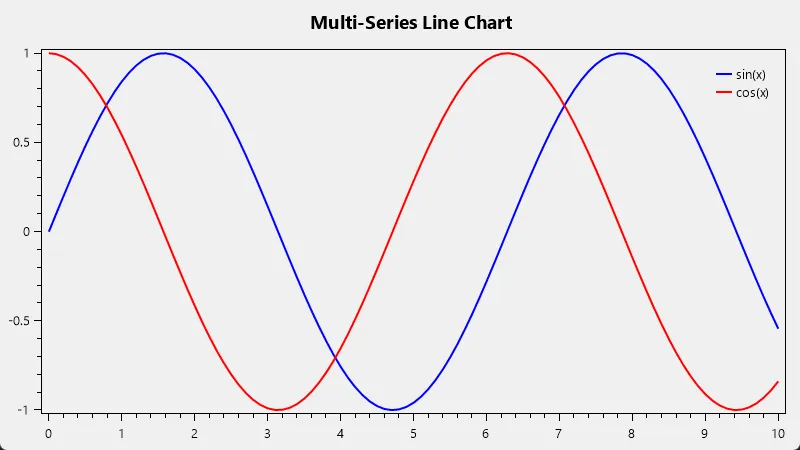
这个例子创建了两个线系列,一个是正弦函数,另一个是余弦函数,并添加了一个图例。
自定义线图样式
OxyPlot提供了丰富的自定义选项。以下是一个自定义样式的示例:
C#private void CreateCustomStyledLineChart()
{
var plotView = new PlotView();
plotView.Dock = DockStyle.Fill;
this.Controls.Add(plotView);
var plotModel = new PlotModel
{
Title = "Custom Styled Line Chart",
TitleColor = OxyColors.DarkBlue,
PlotAreaBorderColor = OxyColors.LightGray,
PlotAreaBorderThickness = new OxyThickness(1)
};
var series = new LineSeries
{
Title = "Custom Series",
Color = OxyColors.Red,
StrokeThickness = 3,
MarkerType = MarkerType.Circle,
MarkerSize = 4,
MarkerStroke = OxyColors.Black,
MarkerFill = OxyColors.Yellow
};
for (int i = 0; i < 10; i++)
{
series.Points.Add(new DataPoint(i, Math.Pow(i, 2)));
}
plotModel.Series.Add(series);
var xAxis = new LinearAxis
{
Position = AxisPosition.Bottom,
Title = "X Axis",
TitleColor = OxyColors.DarkGreen,
AxislineColor = OxyColors.DarkGray,
MajorGridlineStyle = LineStyle.Dash,
MinorGridlineStyle = LineStyle.Dot
};
var yAxis = new LinearAxis
{
Position = AxisPosition.Left,
Title = "Y Axis",
TitleColor = OxyColors.DarkGreen,
AxislineColor = OxyColors.DarkGray,
MajorGridlineStyle = LineStyle.Dash,
MinorGridlineStyle = LineStyle.Dot
};
plotModel.Axes.Add(xAxis);
plotModel.Axes.Add(yAxis);
plotView.Model = plotModel;
}
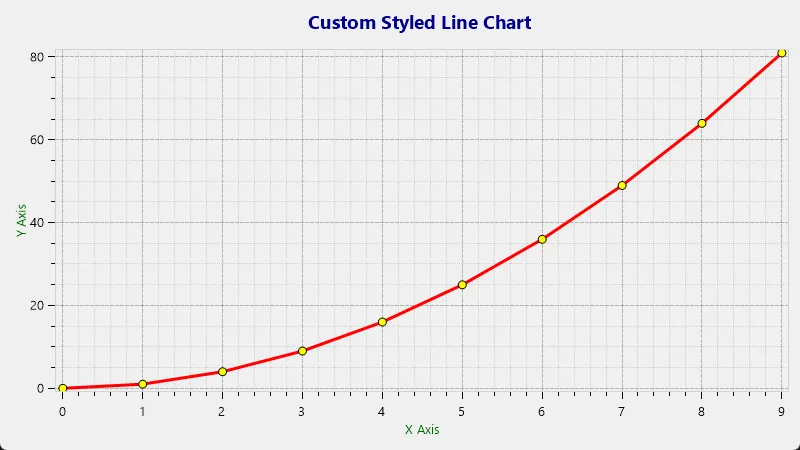
这个例子展示了如何自定义图表的各个方面,包括颜色、线条样式、标记类型等。
对数轴线图
对数轴在显示跨越多个数量级的数据时非常有用。以下是一个使用对数轴的示例:
C#private void CreateLogAxisLineChart()
{
var plotView = new PlotView();
plotView.Dock = DockStyle.Fill;
this.Controls.Add(plotView);
var plotModel = new PlotModel { Title = "Logarithmic Axis Line Chart" };
var series = new LineSeries { Title = "Log Series" };
for (double x = 0.1; x < 1000; x *= 1.1)
{
series.Points.Add(new DataPoint(x, Math.Log10(x)));
}
plotModel.Series.Add(series);
plotModel.Axes.Add(new LogarithmicAxis { Position = AxisPosition.Bottom, Title = "Log X" });
plotModel.Axes.Add(new LinearAxis { Position = AxisPosition.Left, Title = "Y" });
plotView.Model = plotModel;
}
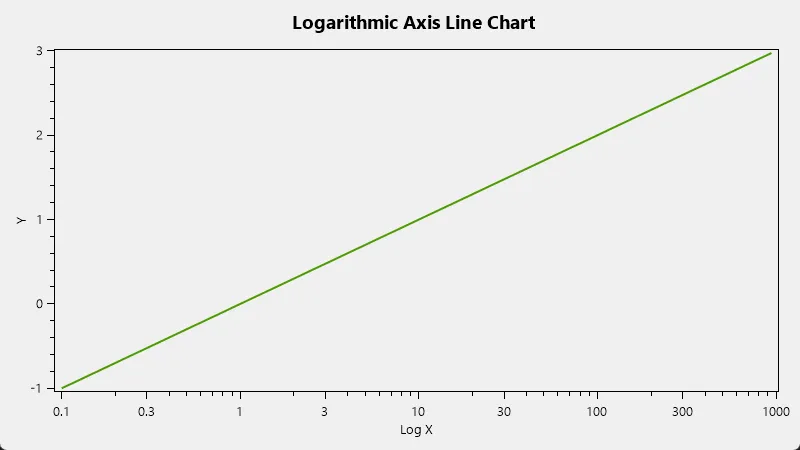
这个例子创建了一个x轴为对数刻度的线图。
日期时间轴线图
对于时间序列数据,使用日期时间轴非常有用。以下是一个示例:
C#private void CreateDateTimeAxisLineChart()
{
var plotView = new PlotView();
plotView.Dock = DockStyle.Fill;
this.Controls.Add(plotView);
var plotModel = new PlotModel { Title = "Date Time Axis Line Chart" };
var series = new LineSeries { Title = "Time Series" };
var startDate = new DateTime(2023, 1, 1);
for (int i = 0; i < 365; i++)
{
var x = DateTimeAxis.ToDouble(startDate.AddDays(i));
var y = Math.Sin(i * 0.1) * 10 + 20; // 模拟温度数据
series.Points.Add(new DataPoint(x, y));
}
plotModel.Series.Add(series);
plotModel.Axes.Add(new DateTimeAxis { Position = AxisPosition.Bottom, Title = "Date", StringFormat = "yyyy-MM-dd" });
plotModel.Axes.Add(new LinearAxis { Position = AxisPosition.Left, Title = "Temperature (°C)" });
plotView.Model = plotModel;
}
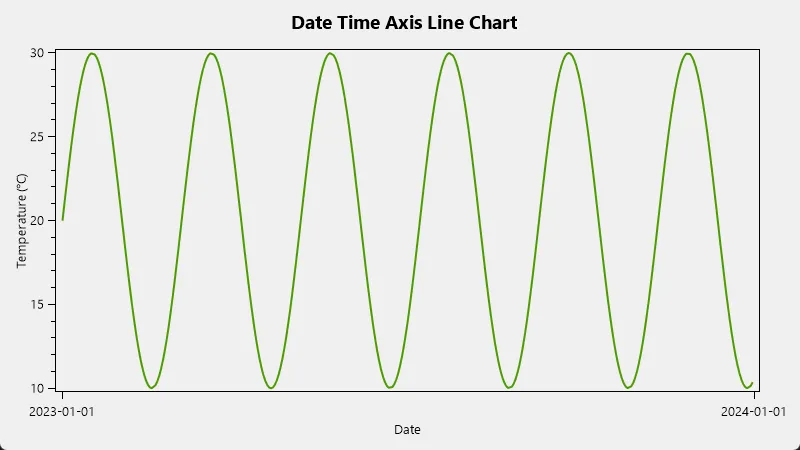
这个例子创建了一个带有日期时间x轴的线图,模拟了一年的温度变化。
带标记的线图
添加数据点标记可以使线图更易读。以下是一个带标记的线图示例:
C#private void CreateLineChartWithMarkers()
{
var plotView = new PlotView();
plotView.Dock = DockStyle.Fill;
this.Controls.Add(plotView);
var plotModel = new PlotModel { Title = "Line Chart with Markers" };
var series = new LineSeries
{
Title = "Data Series",
MarkerType = MarkerType.Circle,
MarkerSize = 4,
MarkerStroke = OxyColors.White,
MarkerFill = OxyColors.SkyBlue,
MarkerStrokeThickness = 1.5
};
for (int i = 0; i < 10; i++)
{
series.Points.Add(new DataPoint(i, Math.Pow(i, 2)));
}
plotModel.Series.Add(series);
plotView.Model = plotModel;
}
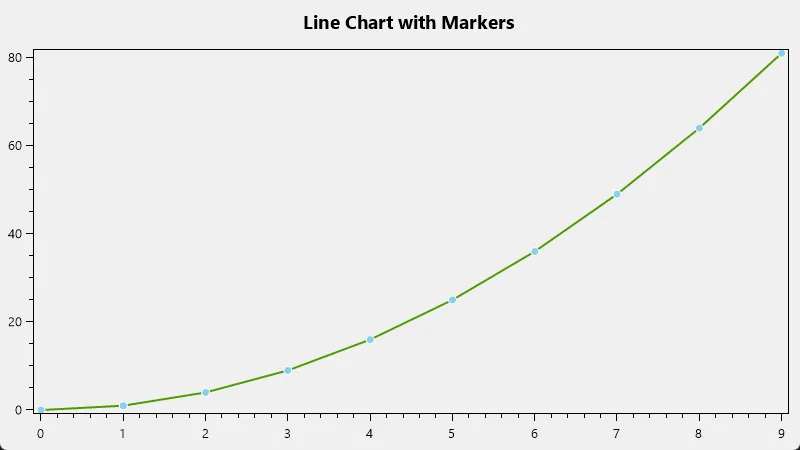
这个例子创建了一个带有圆形标记的线图。
阶梯线图
阶梯线图在显示离散变化的数据时很有用。以下是一个阶梯线图的示例:
C#private void CreateStepLineChart()
{
var plotView = new PlotView();
plotView.Dock = DockStyle.Fill;
this.Controls.Add(plotView);
var plotModel = new PlotModel { Title = "Step Line Chart" };
var series = new StairStepSeries
{
Title = "Step Series",
Color = OxyColors.Green,
StrokeThickness = 2,
MarkerType = MarkerType.Circle,
MarkerSize = 4,
MarkerStroke = OxyColors.Black,
MarkerFill = OxyColors.Green
};
for (int i = 0; i < 10; i++)
{
series.Points.Add(new DataPoint(i, Math.Pow(i, 2)));
}
plotModel.Series.Add(series);
plotView.Model = plotModel;
}
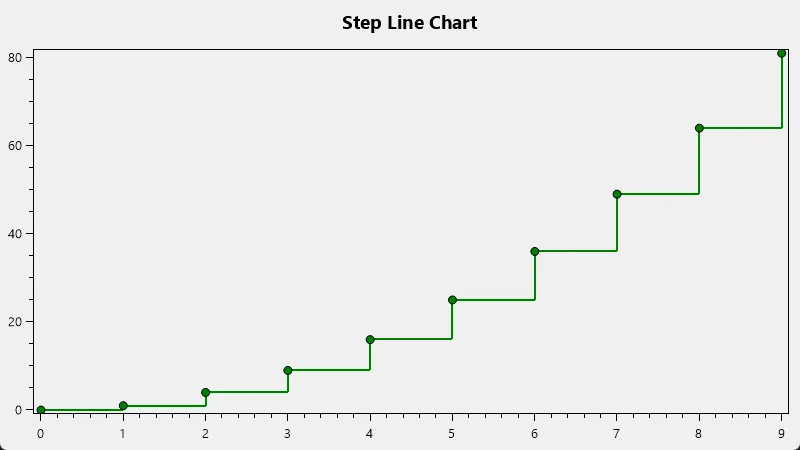
这个例子创建了一个阶梯线图,每个数据点之间用水平和垂直线段连接。
面积图
面积图可以用来显示累积数据或比较多个数据系列。以下是一个面积图的示例:
C#private void CreateAreaChart()
{
var plotView = new PlotView();
plotView.Dock = DockStyle.Fill;
this.Controls.Add(plotView);
var plotModel = new PlotModel { Title = "Area Chart" };
var series1 = new AreaSeries
{
Title = "Series 1",
Color = OxyColor.FromArgb(200, 255, 100, 100),
Fill = OxyColor.FromArgb(100, 255, 100, 100)
};
var series2 = new AreaSeries
{
Title = "Series 2",
Color = OxyColor.FromArgb(200, 100, 100, 255),
Fill = OxyColor.FromArgb(100, 100, 100, 255)
};
for (int i = 0; i < 10; i++)
{
series1.Points.Add(new DataPoint(i, Math.Sin(i * 0.5) * 10 + 20));
series2.Points.Add(new DataPoint(i, Math.Cos(i * 0.5) * 10 + 10));
}
plotModel.Series.Add(series1);
plotModel.Series.Add(series2);
plotModel.Legends.Add(new Legend
{
LegendPosition = LegendPosition.TopLeft,
LegendPlacement = LegendPlacement.Inside
});
plotView.Model = plotModel;
}
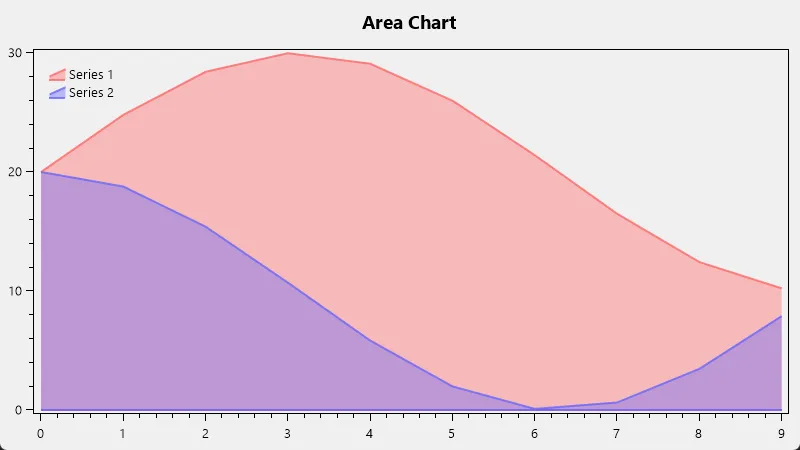
这个例子创建了两个重叠的面积图系列。
交互式线图
OxyPlot支持多种交互功能,如缩放、平移和工具提示。以下是一个添加这些功能的示例:
C#private void CreateInteractiveLineChart()
{
var plotView = new PlotView();
plotView.Dock = DockStyle.Fill;
this.Controls.Add(plotView);
var plotModel = new PlotModel { Title = "Interactive Line Chart" };
var series = new LineSeries
{
Title = "Interactive Series",
Color = OxyColors.Blue,
StrokeThickness = 2,
MarkerType = MarkerType.Circle,
MarkerSize = 3,
MarkerStroke = OxyColors.White,
MarkerFill = OxyColors.Blue,
TrackerFormatString = "X: {2:0.00}\nY: {4:0.00}"
};
for (int i = 0; i < 100; i++)
{
series.Points.Add(new DataPoint(i, Math.Sin(i * 0.1) * 10));
}
plotModel.Series.Add(series);
// 启用缩放和平移
plotModel.IsLegendVisible = true;
plotModel.LegendPlacement = LegendPlacement.Outside;
plotModel.LegendPosition = LegendPosition.RightTop;
plotModel.LegendOrientation = LegendOrientation.Vertical;
plotView.Model = plotModel;
plotView.Controller = new PlotController();
}
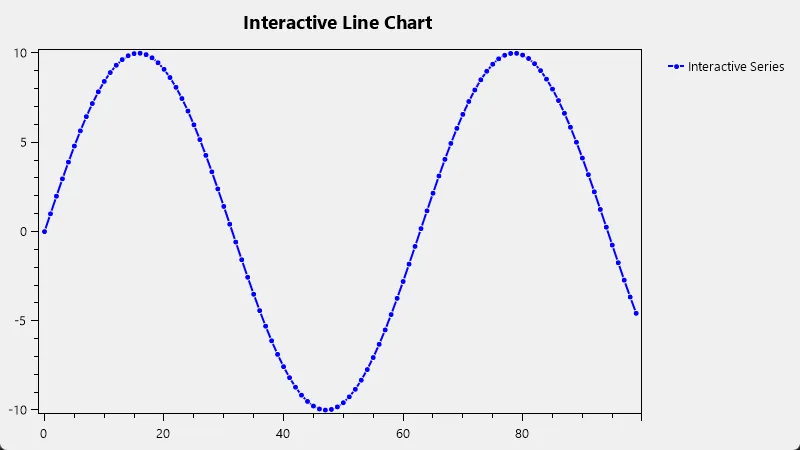
这个例子添加了工具提示功能,当用户将鼠标悬停在数据点上时,会显示该点的X和Y值。同时,用户可以使用鼠标进行缩放和平移操作。
动态更新数据
在实时应用中,我们经常需要动态更新图表数据。以下是一个示例,展示如何创建一个实时更新的线图:
C#public partial class Form1 : Form
{
private PlotModel plotModel;
private LineSeries series;
private Timer timer;
private int dataIndex = 0;
public Form1()
{
InitializeComponent();
CreateDynamicLineChart();
}
private void CreateDynamicLineChart()
{
var plotView = new PlotView();
plotView.Dock = DockStyle.Fill;
this.Controls.Add(plotView);
plotModel = new PlotModel { Title = "Dynamic Line Chart" };
series = new LineSeries { Title = "Real-time Data" };
plotModel.Series.Add(series);
plotView.Model = plotModel;
timer = new Timer();
timer.Interval = 100; // 每100毫秒更新一次
timer.Tick += Timer_Tick;
timer.Start();
}
private void Timer_Tick(object sender, EventArgs e)
{
// 生成新的数据点
double y = Math.Sin(dataIndex * 0.1) * 10 + Random.Shared.NextDouble() * 5;
series.Points.Add(new DataPoint(dataIndex, y));
// 保持最多显示100个点
if (series.Points.Count > 100)
series.Points.RemoveAt(0);
// 更新X轴范围
plotModel.Axes[0].Minimum = Math.Max(0, dataIndex - 100);
plotModel.Axes[0].Maximum = dataIndex;
// 刷新图表
plotModel.InvalidatePlot(true);
dataIndex++;
}
}
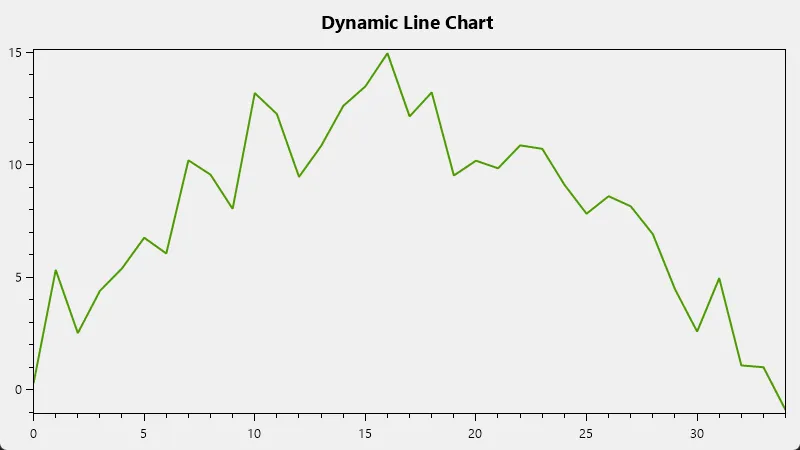
这个例子创建了一个动态更新的线图,每100毫秒添加一个新的数据点,并保持最多显示100个点。
多Y轴线图
当需要在同一图表中显示具有不同范围的多个数据系列时,多Y轴非常有用。以下是一个示例:
C#private void CreateMultipleYAxisLineChart()
{
var plotView = new PlotView();
plotView.Dock = DockStyle.Fill;
this.Controls.Add(plotView);
var plotModel = new PlotModel { Title = "Multiple Y-Axis Line Chart" };
var series1 = new LineSeries
{
Title = "Series 1 (Left Axis)",
Color = OxyColors.Blue,
YAxisKey = "Left"
};
var series2 = new LineSeries
{
Title = "Series 2 (Right Axis)",
Color = OxyColors.Red,
YAxisKey = "Right"
};
for (int i = 0; i < 100; i++)
{
series1.Points.Add(new DataPoint(i, Math.Sin(i * 0.1) * 10));
series2.Points.Add(new DataPoint(i, Math.Cos(i * 0.1) * 1000));
}
plotModel.Series.Add(series1);
plotModel.Series.Add(series2);
plotModel.Axes.Add(new LinearAxis
{
Position = AxisPosition.Left,
Title = "Left Axis",
Key = "Left",
TextColor = OxyColors.Blue
});
plotModel.Axes.Add(new LinearAxis
{
Position = AxisPosition.Right,
Title = "Right Axis",
Key = "Right",
TextColor = OxyColors.Red
});
plotModel.Legends.Add(new Legend
{
LegendPosition = LegendPosition.TopLeft,
LegendPlacement = LegendPlacement.Inside
});
plotView.Model = plotModel;
}
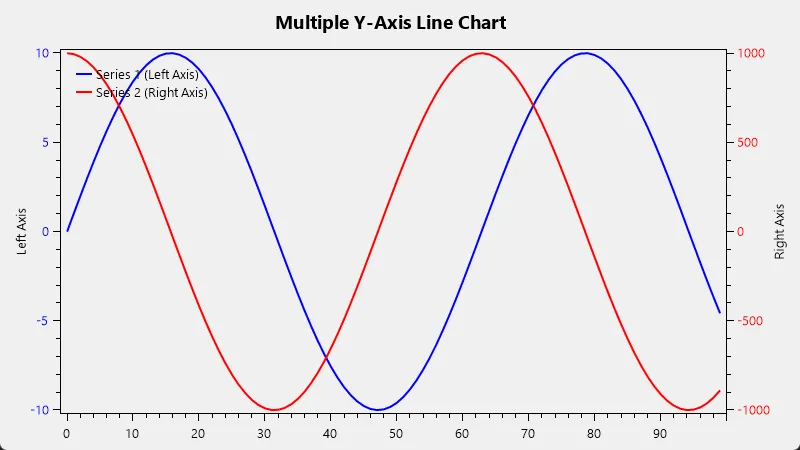
这个例子创建了一个具有两个Y轴的图表,每个系列使用不同的Y轴。
带注释的线图
注释可以用来突出显示图表中的特定点或区域。以下是一个带注释的线图示例:
C#private void CreateAnnotatedLineChart()
{
var plotView = new PlotView();
plotView.Dock = DockStyle.Fill;
this.Controls.Add(plotView);
var plotModel = new PlotModel { Title = "Annotated Line Chart" };
var series = new LineSeries { Title = "Data Series" };
for (int i = 0; i < 100; i++)
{
series.Points.Add(new DataPoint(i, Math.Sin(i * 0.1) * 10));
}
plotModel.Series.Add(series);
// 添加点注释
plotModel.Annotations.Add(new PointAnnotation
{
X = 50,
Y = Math.Sin(50 * 0.1) * 10,
Text = "Peak"
});
// 添加文本注释
plotModel.Annotations.Add(new TextAnnotation
{
TextPosition = new DataPoint(25, 8),
Text = "Important Region"
});
// 添加区域注释
plotModel.Annotations.Add(new RectangleAnnotation
{
MinimumX = 60,
MaximumX = 80,
MinimumY = -10,
MaximumY = 10,
Fill = OxyColor.FromAColor(120, OxyColors.SkyBlue),
Text = "Interesting Area"
});
plotView.Model = plotModel;
}
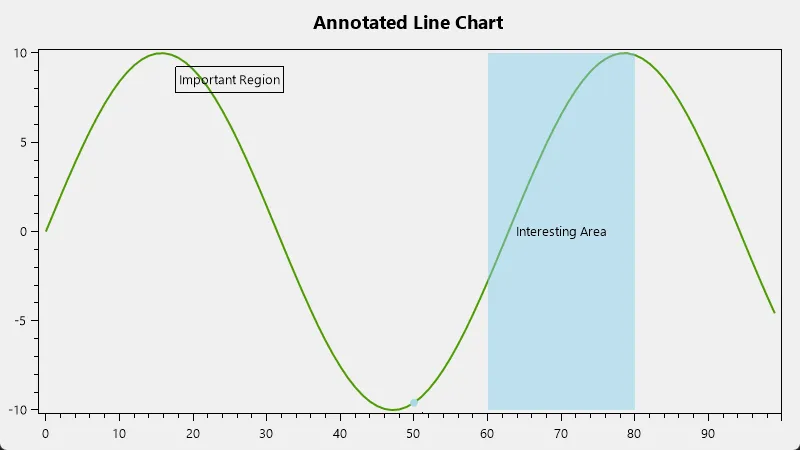
这个例子展示了如何添加点注释、文本注释和区域注释到线图中。
虚线和点线
OxyPlot支持各种线型,包括虚线和点线。以下是一个示例:
C#private void CreateDashedLineChart()
{
var plotView = new PlotView();
plotView.Dock = DockStyle.Fill;
this.Controls.Add(plotView);
var plotModel = new PlotModel { Title = "Dashed and Dotted Line Chart" };
var series1 = new LineSeries
{
Title = "Dashed Line",
LineStyle = LineStyle.Dash,
Color = OxyColors.Blue
};
var series2 = new LineSeries
{
Title = "Dotted Line",
LineStyle = LineStyle.Dot,
Color = OxyColors.Red
};
var series3 = new LineSeries
{
Title = "Dash-Dot Line",
LineStyle = LineStyle.DashDot,
Color = OxyColors.Green
};
for (int i = 0; i < 100; i++)
{
series1.Points.Add(new DataPoint(i, Math.Sin(i * 0.1) * 10));
series2.Points.Add(new DataPoint(i, Math.Cos(i * 0.1) * 10));
series3.Points.Add(new DataPoint(i, Math.Tan(i * 0.1)));
}
plotModel.Series.Add(series1);
plotModel.Series.Add(series2);
plotModel.Series.Add(series3);
plotModel.Legends.Add(new Legend
{
LegendPosition = LegendPosition.TopRight,
LegendPlacement = LegendPlacement.Inside
});
plotView.Model = plotModel;
}

这个例子创建了三个不同线型的系列:虚线、点线和虚点线。
带误差条的线图
在科学和统计分析中,误差条常用于表示数据的不确定性。以下是一个带误差条的线图示例:
C#private void CreateLineChartWithErrorBars()
{
var plotView = new PlotView();
plotView.Dock = DockStyle.Fill;
this.Controls.Add(plotView);
var plotModel = new PlotModel { Title = "Line Chart with Error Bars" };
var series = new LineSeries { Title = "Data with Error" };
var errorSeries = new ErrorBarSeries { Title = "Error" };
var random = new Random(0);
for (int i = 0; i < 10; i++)
{
double y = Math.Sin(i * 0.5) * 10;
double error = random.NextDouble() * 2;
series.Points.Add(new DataPoint(i, y));
errorSeries.Items.Add(new ErrorBarItem(i, error));
}
plotModel.Series.Add(series);
plotModel.Series.Add(errorSeries);
plotView.Model = plotModel;
}
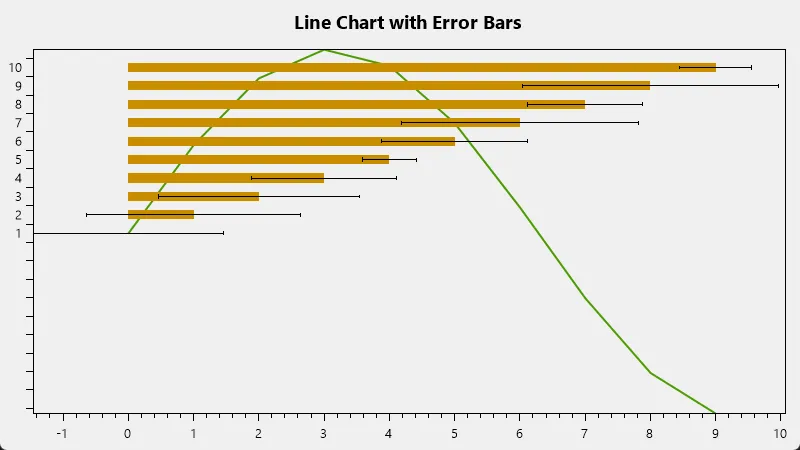
这个例子创建了一个带有误差条的线图,误差条表示每个数据点的不确定性范围。
平滑曲线
对于某些应用,可能需要平滑的曲线而不是直线段。OxyPlot提供了创建平滑曲线的选项:
C#private void CreateSmoothLineChart()
{
var plotView = new PlotView();
plotView.Dock = DockStyle.Fill;
this.Controls.Add(plotView);
var plotModel = new PlotModel { Title = "Smooth Line Chart" };
var series = new LineSeries
{
Title = "Smooth Curve",
InterpolationAlgorithm = InterpolationAlgorithms.CanonicalSpline
};
for (int i = 0; i < 10; i++)
{
series.Points.Add(new DataPoint(i, Math.Sin(i * 0.5) * 10));
}
plotModel.Series.Add(series);
plotView.Model = plotModel;
}
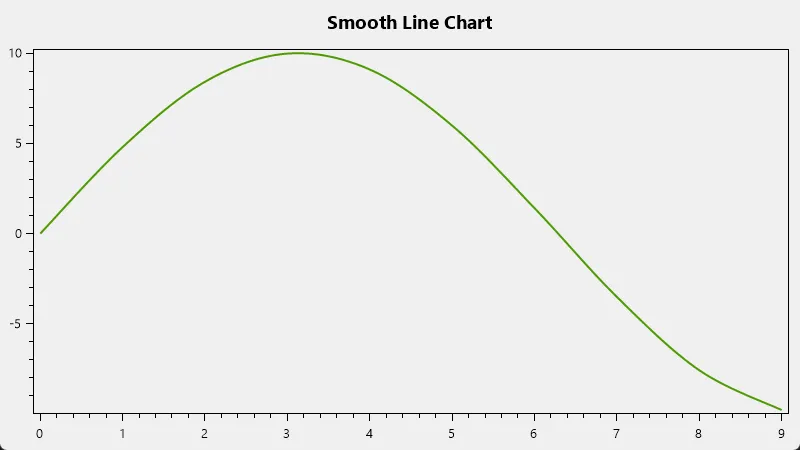 这个例子使用了样条插值算法来创建平滑的曲线。
这个例子使用了样条插值算法来创建平滑的曲线。
自定义工具提示
OxyPlot允许自定义工具提示的内容和格式。以下是一个示例:
C#private void CreateCustomTooltipLineChart()
{
var plotView = new PlotView();
plotView.Dock = DockStyle.Fill;
this.Controls.Add(plotView);
var plotModel = new PlotModel { Title = "Custom Tooltip Line Chart" };
var series = new LineSeries
{
Title = "Custom Tooltip Series",
TrackerFormatString = "Point: {2:0.00}, {4:0.00}\nValue: {4:0.00}\nTime: {2:hh:mm:ss}"
};
var startTime = DateTime.Now;
for (int i = 0; i < 100; i++)
{
var time = DateTimeAxis.ToDouble(startTime.AddMinutes(i));
series.Points.Add(new DataPoint(time, Math.Sin(i * 0.1) * 10));
}
plotModel.Series.Add(series);
plotModel.Axes.Add(new DateTimeAxis { Position = AxisPosition.Bottom, StringFormat = "HH:mm:ss" });
plotView.Model = plotModel;
}
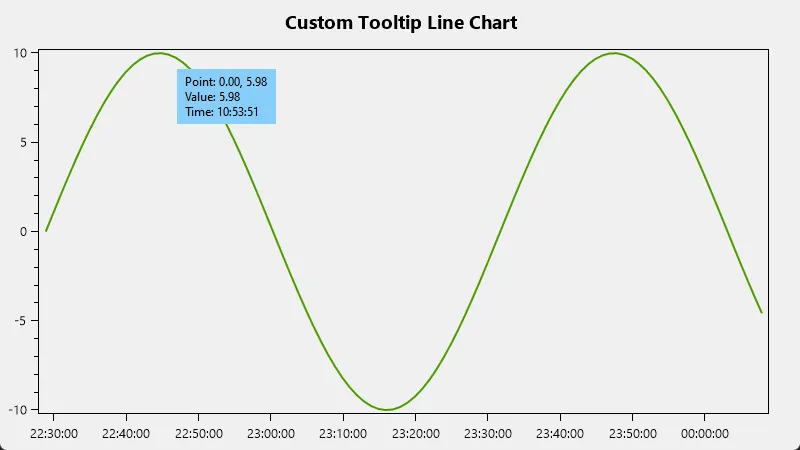 这个例子自定义了工具提示,显示点的坐标、值和时间。
这个例子自定义了工具提示,显示点的坐标、值和时间。
导出图表
OxyPlot支持将图表导出为各种格式,如PNG、SVG等。以下是一个导出图表的示例:
C#private void ExportChart(PlotModel plotModel, string fileName)
{
var pngExporter = new PngExporter { Width = 600, Height = 400 };
pngExporter.ExportToFile(plotModel, fileName);
MessageBox.Show($"Chart exported to {fileName}", "Export Successful", MessageBoxButtons.OK, MessageBoxIcon.Information);
}
// 在某个按钮点击事件中调用
private void exportButton_Click(object sender, EventArgs e)
{
using (SaveFileDialog saveFileDialog = new SaveFileDialog())
{
saveFileDialog.Filter = "PNG Image|*.png";
saveFileDialog.Title = "Save Chart as PNG";
saveFileDialog.FileName = "Chart.png";
if (saveFileDialog.ShowDialog() == DialogResult.OK)
{
ExportChart(plotView.Model, saveFileDialog.FileName);
}
}
}
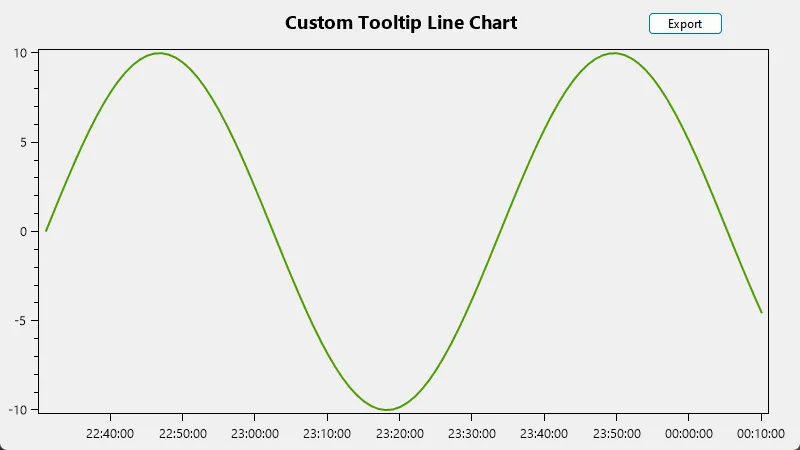 这个例子展示了如何将图表导出为PNG文件。
这个例子展示了如何将图表导出为PNG文件。
最佳实践和性能优化
- 数据点优化:对于大量数据点,考虑使用
DataPointSeries而不是LineSeries。 - 异步加载:对于大型数据集,考虑在后台线程中加载数据。
- 缓存:如果数据不经常变化,可以缓存
PlotModel以提高性能。 - 限制更新频率:对于实时数据,限制更新频率以避免过度重绘。
- 使用适当的轴类型:例如,对于日期时间数据使用
DateTimeAxis。 - 避免过度使用注释:大量注释可能会影响性能。
结论
OxyPlot为WinForms应用程序提供了强大而灵活的线图创建功能。从基本的线图到复杂的多轴、多系列图表,从静态展示到动态更新,OxyPlot都能满足各种需求。通过本指南中的示例和技巧,您应该能够在WinForms应用中创建出专业、美观且功能丰富的线图。
记住,图表的最终目标是清晰、有效地传达信息。在追求复杂功能的同时,也要注意保持图表的简洁和可读性。随着实践的深入,您将能够更好地平衡这些因素,创建出既美观又实用的图表。
本文作者:rick
本文链接:
版权声明:本博客所有文章除特别声明外,均采用 BY-NC-SA 许可协议。转载请注明出处!